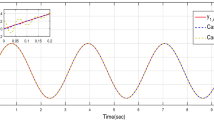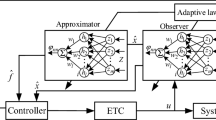Abstract
This paper studies the event-based decentralized adaptive finite-time tracking control problem of the interconnected nonlinear time-varying systems. A novel tracking control strategy associating event-triggered techniques, dynamic surface control, and finite-time control is presented. Correspondingly, the newly designed controller not only ensures finite-time convergence but also decreases the communication burden between the controller and the actuator. Moreover, the complexity explosion problem caused by the backstep** design procedure can be excluded. In addition, the difficulty caused by the system uncertainty is solved by utilizing bound estimation methods and constructing a suitable smooth function. Simulation results verify the effectiveness of our proposed control strategy.









Similar content being viewed by others
Data Availability Statement
Data sharing is not applicable to this article as no datasets were generated or analyzed during the current study.
References
Du, P., Liang, H., Zhao, S., Ahn, C.K.: Neural-based decentralized adaptive finite-time control for nonlinear large-scale systems with time-varying output constraints. IEEE Trans. Syst. Man Cybern. Syst. 51(5), 3136–3147 (2019)
Li, S., Ahn, C.K., **ang, Z.: Decentralized stabilization for switched large-scale nonlinear systems via sampled-data output feedback. IEEE Syst. J. 13(4), 4335–4343 (2019)
Li, Y.X., Yang, G.H., Tong, S.: Fuzzy adaptive distributed event-triggered consensus control of uncertain nonlinear multiagent systems. IEEE Trans. Syst. Man Cybern. Syst. 49(9), 1777–1786 (2018)
Dao, P.N., Liu, Y.C.: Adaptive reinforcement learning in control design for cooperating manipulator systems. Asian J. Control (2022)
Tong, S., Li, Y., Liu, Y.: Observer-based adaptive neural networks control for large-scale interconnected systems with nonconstant control gains. IEEE Trans. Neural Netw. Learn. Syst. 32(4), 1575–1585 (2020)
Li, X., Liu, X.: Backstep**-based decentralized adaptive neural \(H_ {\infty }\) control for a class of large-scale nonlinear systems with expanding construction. Nonlinear Dyn. 90(2), 1373–1392 (2017)
Ma, M., Wang, T., Qiu, J., Karimi, H.R.: Adaptive fuzzy decentralized tracking control for large-scale interconnected nonlinear networked control systems. IEEE Trans. Fuzzy Syst. 29(10), 3186–3191 (2020)
Wang, H., Liu, X., Chen, B., Zhou, Q.: Adaptive fuzzy decentralized control for a class of pure-feedback large-scale nonlinear systems. Nonlinear Dyn. 75(3), 449–460 (2014)
Sun, H., Zong, G., Chen, C.P.: Adaptive decentralized output feedback PI tracking control design for uncertain interconnected nonlinear systems with input quantization. Inf. Sci. 512, 186–206 (2020)
Wang, H., Liu, W., Qiu, J., Liu, P.X.: Adaptive fuzzy decentralized control for a class of strong interconnected nonlinear systems with unmodeled dynamics. IEEE Trans. Fuzzy Syst. 26(2), 836–846 (2017)
Ma, H.J., Xu, L.X.: Decentralized adaptive fault-tolerant control for a class of strong interconnected nonlinear systems via graph theory. IEEE Trans. Autom. Control 66(7), 3227–3234 (2020)
An, L., Yang, G.H.: Decentralized adaptive fuzzy secure control for nonlinear uncertain interconnected systems against intermittent DoS attacks. IEEE T. Cybern. 49(3), 827–838 (2018)
Niu, B., Liu, J., Wang, D., Zhao, X., Wang, H.: Adaptive decentralized asymptotic tracking control for large-scale nonlinear systems with unknown strong interconnections. IEEE-CAA J. Automatica Sin. 9(1), 173–186 (2021)
Wang, F., Chen, B., Liu, X., Lin, C.: Finite-time adaptive fuzzy tracking control design for nonlinear systems. IEEE Trans. Fuzzy Syst. 26(3), 1207–1216 (2017)
**a, J., Zhang, J., Sun, W., Zhang, B., Wang, Z.: Finite-time adaptive fuzzy control for nonlinear systems with full state constraints. IEEE Trans. Syst. Man Cybern. Syst. 49(7), 1541–1548 (2018)
Wang, H., Bai, W., Liu, P.X.: Finite-time adaptive fault-tolerant control for nonlinear systems with multiple faults. IEEE-CAA J. Automatica Sin. 6(6), 1417–1427 (2019)
Sun, K., Qiu, J., Karimi, H.R., Gao, H.: A novel finite-time control for nonstrict feedback saturated nonlinear systems with tracking error constraint. IEEE Trans. Syst. Man Cybern. Syst. 51(6), 3968–3979 (2019)
Song, S., Park, J.H., Zhang, B., Song, X.: Composite adaptive fuzzy finite-time quantized control for full state-constrained nonlinear systems and its application. IEEE Trans. Syst. Man Cybern. Syst. 52(4), 2479–2490 (2021)
Sun, Y., Chen, B., Lin, C., Wang, H.: Finite-time adaptive control for a class of nonlinear systems with nonstrict feedback structure. IEEE T. Cybern. 48(10), 2774–2782 (2017)
Wang, H., Liu, P.X., Zhao, X., Liu, X.: Adaptive fuzzy finite-time control of nonlinear systems with actuator faults. IEEE Trans. Cybern. 50(5), 1786–1797 (2019)
Zhang, H., Liu, Y., Dai, J., Wang, Y.: Command filter based adaptive fuzzy finite-time control for a class of uncertain nonlinear systems with hysteresis. IEEE Trans. Fuzzy Syst. 29(9), 2553–2564 (2020)
Li, Y.X.: Finite time command filtered adaptive fault tolerant control for a class of uncertain nonlinear systems. Automatica 106, 117–123 (2019)
Wang, M., Wang, C.: Neural learning control of pure-feedback nonlinear systems. Nonlinear Dyn. 79, 2589–2608 (2015)
Park, J.H., Park, T.S., Kim, S.H.: Approximation-free output-feedback non-backstep** controller for uncertain SISO nonautonomous nonlinear pure-feedback systems. Mathematics 7(5), 456 (2019)
Sui, S., Tong, S., Chen, C.P.: Finite-time filter decentralized control for nonstrict-feedback nonlinear large-scale systems. IEEE Trans. Fuzzy Syst. 26(6), 3289–3300 (2018)
**, X.: Adaptive decentralized finite-time output tracking control for MIMO interconnected nonlinear systems with output constraints and actuator faults. Int. J. Robust Nonlinear Control 28(5), 1808–1829 (2018)
Sun, H., Hou, L.: Adaptive decentralized finite-time tracking control for uncertain interconnected nonlinear systems with input quantization. Int. J. Robust Nonlinear Control 31(10), 4491–4510 (2021)
Dao, P.N., Nguyen, V.T., Liu, Y.C.: Finite-time convergence for bilateral teleoperation systems with disturbance and time-varying delays. IET Contr. Theory Appl. 15(13), 1736–1748 (2021)
Li, Y.X., Yang, G.H.: Adaptive neural control of pure-feedback nonlinear systems with event-triggered communications. IEEE Trans. Neural Netw. Learn. Syst. 29(12), 6242–6251 (2018)
Zhang, J., Li, S., **ang, Z.: Adaptive fuzzy output feedback event-triggered control for a class of switched nonlinear systems with sensor failures. IEEE Trans. Circuits Syst. I-Regul. Pap. 67(12), 5336–5346 (2020)
Zhao, D., Polycarpou, M.M.: Fault accommodation for a class of nonlinear uncertain systems with event-triggered input. IEEE-CAA J. Automatica Sin. 9(2), 235–245 (2021)
Yao, X.Y., Park, J.H., Ding, H.F., Ge, M.F.: Event-triggered consensus control for networked underactuated robotic systems. IEEE Trans. Cybern. 52(5), 2896–2906 (2020)
Lu, K., Liu, Z., Lai, G., Chen, C.P., Zhang, Y.: Adaptive fuzzy output feedback control for nonlinear systems based on event-triggered mechanism. Inf. Sci. 486, 419–433 (2019)
**ng, L., Wen, C., Liu, Z., Su, H., Cai, J.: Event-triggered adaptive control for a class of uncertain nonlinear systems. IEEE Trans. Autom. Control 62(4), 2071–2076 (2016)
Hua, C., Li, K., Guan, X.: Decentralized event-triggered control for interconnected time-delay stochastic nonlinear systems using neural networks. Neurocomputing 272, 270–278 (2018)
Li, Y.X., Tong, S., Yang, G.H.: Observer-based adaptive fuzzy decentralized event-triggered control of interconnected nonlinear system. IEEE Trans. Cybern. 50(7), 3104–3112 (2019)
Wang, C.C., Yang, G.H.: Event-triggered decentralized output-feedback control for interconnected nonlinear systems with input quantization. J. Frankl. Inst. 356(13), 7028–7048 (2019)
Wang, X., Jiang, K., Zhang, G., Niu, B.: Event-triggered-based adaptive decentralized asymptotic tracking control scheme for a class of nonlinear pure-feedback interconnected systems. Nonlinear Dyn. 104(4), 3881–3895 (2021)
Wang, C., Lin, Y.: Decentralized adaptive tracking control for a class of interconnected nonlinear time-varying systems. Automatica 54, 16–24 (2015)
Funding
This work was supported in part by the Funds of National Science of China (Grant Nos. 61973146, 62173172), in part by the Distinguished Young Scientific Research Talents Plan in Liaoning Province (Grant Nos. XLYC1907077, JQL201915402), in part by the Taishan Scholar Project of Shandong Province of China (Grant No. tsqn201909097), and in part by the Applied Basic Research Program in Liaoning Province (Grant No. 2022JH2/101300276).
Author information
Authors and Affiliations
Corresponding author
Ethics declarations
Conflict of interest
The authors declare that they have no conflict of interest.
Additional information
Publisher's Note
Springer Nature remains neutral with regard to jurisdictional claims in published maps and institutional affiliations.
Appendices
Appendix: Derivation of inequality (28)
Proof
Based on Assumption 2 and Lemma 1, one can obtain
Then, from (26), one has
Noting \(\underline{g}_{i,1}\tilde{\ell }_{i,1}-\underline{g}_{i,1}\hat{\ell }_{i,1}=-\underline{{g}}_{i,1}\ell _{i,1}=-1\), which yields (28). This ends the proof of (28). \(\square \)
Appendix: Derivation of inequality (75)
Proof
Define the compact set as follows \( \varPi _{i0}:=\{(y_{di},\dot{y}_{di}, \ddot{y}_{di}):y^2_{di}+\dot{y}_{di}^2+\ddot{y}_{di}^2\le K _{0}\}\), \(\varPi _{i,k}:=\{V_i(t)\le p_i\}\) where \(K_{0}\), \(p_i>0\), \(i=1,\ldots ,N\), \(k=1,\ldots ,n_i-1\). Clearly, for every i and k, \(\varPi _{i0}\times \varPi _{i,k}\) is also a compact set. Therefore, the continuous function \(B_{i,k}\) has a maximum, say, \(M_{i,k}\), on \(\varPi _{i0}\times \varPi _{i,k}\). Hence, one has \(|B_{i,k}|\le M_{i,k}\).
Thus, according to Lemma 3, and substituting (70)–(72) into (69), we get
with \(c_{i}=\min _{1\le i\le N, 1\le q\le n_i}\{2^{\beta -1} \underline{k_i}, 2\left( \frac{1}{\lambda _{i,q}}-1\right) ,\sigma _{\nu _i}\gamma _{\nu _i},\sigma _{\rho _i}\gamma _{\rho _i},\sigma _{\ell _{i,q}}\gamma _{\ell _{i,q}}\}\), \(\underline{k_i}=\min _{1\le q\le n_i}\{k_{i,q}\}\) and \(h_i=\sum _{j=1}^{N}\sum _{q=1}^{n_j}\varrho _{j,q,i}\phi _{j,q,i}(y_i) -\rho _iz_{i,1}\varphi _i\) are the uncertain terms generated by interactions.
Due to \(\phi _{j,q,i}\ge 0\) and the definitions of \(\rho _i\) and \(\varphi _i\), we have
By (B.2), it can be deduced that, for each \(i=1,\ldots ,N\), on the one hand, if \(\mid z_{i,1}\mid > \sqrt{\lambda _i}\), \(h_i<0\). And on the other hand, if \(\mid z_{i,1}\mid \le \sqrt{\lambda _i}\), \(y_i\) is bounded from (8). In summary then, \(h_i\) has an upper bound \(H_i \ge 0\).
Then, applying Lemma 4, let \(\var** _1=\sum _{q=2}^{n_i}\frac{1}{2}\phi _{i,q}^2\), \(\var** _2=\frac{1}{2\gamma _{\rho _i}}\tilde{\rho }_i^2\), \(\var** _3=\frac{1}{2\gamma _{\nu _i}}\tilde{\nu }_i^2\), \(\var** _4=\sum _{q=1}^{n_i}\frac{ \underline{g}_{i,q}}{2\gamma _{\ell _{i,q}}}\tilde{\ell }_{i,q}^2\), \(\varDelta =1\), \(\zeta _1=\beta \), \(\zeta _2=1-\beta \), \(\zeta _3=\beta ^{-1}\), it follows that
Then, substituting (B.2) and (B.3) into (B.1), we have
Inequality (75) is then obtained. \(\square \)
Rights and permissions
Springer Nature or its licensor (e.g. a society or other partner) holds exclusive rights to this article under a publishing agreement with the author(s) or other rightsholder(s); author self-archiving of the accepted manuscript version of this article is solely governed by the terms of such publishing agreement and applicable law.
About this article
Cite this article
Shi, S., Li, YX. & Tong, S. Event-based decentralized adaptive finite-time tracking control of interconnected nonlinear time-varying systems. Nonlinear Dyn 111, 3479–3495 (2023). https://doi.org/10.1007/s11071-022-08022-0
Received:
Accepted:
Published:
Issue Date:
DOI: https://doi.org/10.1007/s11071-022-08022-0




